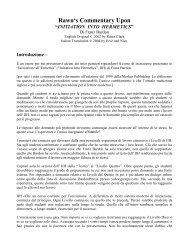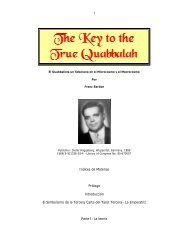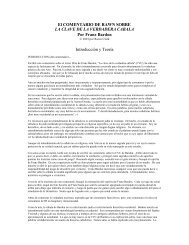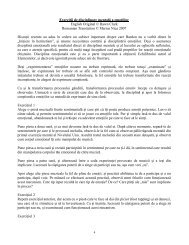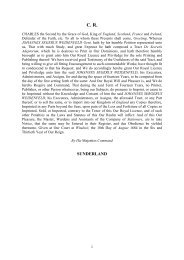Hermetic Philosophy and Alchemy - A Bardon Companion
Hermetic Philosophy and Alchemy - A Bardon Companion
Hermetic Philosophy and Alchemy - A Bardon Companion
Create successful ePaper yourself
Turn your PDF publications into a flip-book with our unique Google optimized e-Paper software.
But we are at Alex<strong>and</strong>ria, <strong>and</strong> during that gr<strong>and</strong> revival which took place <strong>and</strong> continued there some<br />
centuries subsequent to the Christian epoch, Plotinus, Philo-Judaeus, Proclus, Porphyry, Jamblicus,<br />
Julian, <strong>and</strong> Apuleius, each professing a genuine knowledge of the Theurgic art, <strong>and</strong> experimental<br />
physics on the <strong>Hermetic</strong> ground. We shall have frequent occasion to quote their evidence hereafter;<br />
Heliodorus, Olympiodorus, Synesius, Athenagoras, Zosimus, <strong>and</strong> Archelaus, have each left treatises<br />
which are extant on the philosophers’ stone (34) The excellent Hypatia, also, should be mentioned<br />
amongst these, so celebrated for her acquirements <strong>and</strong> untimely end; it was from this lady that<br />
Synesius learned the occult truths of that philosophy, to which he ever afterwards devoted his mind,<br />
<strong>and</strong> which he never ab<strong>and</strong>oned, pursuing it still more zealously when, converted to Christianity, he<br />
became a bishop of the Alex<strong>and</strong>rian Church. He was careful, however, to protect the mysteries of his<br />
religion from vulgar abuse, <strong>and</strong> refused to expound in public the philosophy of Plato; he <strong>and</strong> his<br />
brethren having unanimously bound themselves by oath to initiate none but such as had been worthily<br />
prepared <strong>and</strong> duly approved by the whole conclave (35). Of Synesius, we have the remaining<br />
Alchemical commentary on Democritus before mentioned, with an admirable piece commonly found<br />
appended to other treatises, those of Artephius <strong>and</strong> Flamel’s Hieroglyphics, for example, <strong>and</strong><br />
translated into English, with Basil Valentine’s Chariot of Antimony <strong>and</strong> the useful commentaries of<br />
the adept Kirchringius (36).<br />
Heliodorus was a familiar friend of Synesius, <strong>and</strong> brother adept; besides the writings already named,<br />
the mystical romance of Theagenes <strong>and</strong> Chariclea being attributed to him as an offence, rather than<br />
disavow it, as was required, he relinquished his bishopric of Tricca, in Thessaly, <strong>and</strong> went to pursue<br />
his studies in poverty <strong>and</strong> retirement.<br />
Zosimus was an Egyptian, <strong>and</strong> reputed a great practitioner. The name of Athenagoras is familiar in<br />
Church history; his tract, which has been translated into French, <strong>and</strong> entitled Du Parfait Amour, shows<br />
him to have been practically conversant with the art he allegorizes.<br />
The taking of Alex<strong>and</strong>ria by the Arabs, in the year 640, dispersed the choice remnant of mind yet<br />
centered there; <strong>and</strong> it was not long afterwards that the Calif Omar, mad in his Mohamedan zeal,<br />
condemned her noble <strong>and</strong> unique library to heat the public baths of the city, which it is said to have<br />
done for a space of six miserable months. A wild religious fanaticism now prevailed; Christians <strong>and</strong><br />
Mahomedans struggling for temporal supremacy: --- <strong>and</strong> here we may observe something similar to a<br />
fulfillment of the Asclepian prophecy, but the evil was more profusely spread even than was predicted;<br />
for religion had everywhere fallen off from her vital foundation; tradition <strong>and</strong> secular delirium had<br />
taken place of intellectual enthusiasm, <strong>and</strong> idle dreams were set up as oracles in the place of Divine<br />
inspiration. The priests, above all blameworthy, having forsaken the law of conscience, attempted to<br />
wield without it the rod of magic power. Confusion <strong>and</strong> licentiousness followed; <strong>and</strong> from gradual<br />
sufferance grew, <strong>and</strong> came to prevail, in the worst imaginable forms. Necessity, at length, compelled<br />
an ab<strong>and</strong>onment of the Mysteries; Theurgic rites, no longer holy, were proscribed; <strong>and</strong> a punishment,<br />
no less than death, was menaced against him who dared to pursue the "Religion of Intellect". In the<br />
interim, those few who had withstood the torrent of ambitious temptation, indignant at the multiform<br />
folly, <strong>and</strong> observing by the aid of their remaining wisdom, that the ingression of evil was not yet<br />
fulfilled, hastened rather than delayed the crisis; <strong>and</strong> by burying themselves with their saving science<br />
in profound obscurity, have left the world to oblivion, <strong>and</strong> the deceit of outer darkness, with rare<br />
individual exceptions, to this day.<br />
It is a peculiarity of the <strong>Hermetic</strong> science that men of every religion, time <strong>and</strong> country <strong>and</strong> occupation,<br />
have been found professing it; <strong>and</strong> Arabia, though she was guilty of so great a sacrilege at Alex<strong>and</strong>ria,<br />
has herself produced many wise kings <strong>and</strong> renowned philosophers. It is not known exactly when<br />
Prince Geber lived; but since his name has become notorious, <strong>and</strong> is cited by the oldest authors,<br />
whereas he himself quotes none, he merits, at all events, an early consideration. Besides, he is<br />
generally esteemed by adepts as the greatest, after Hermes, of all who have philosophized through this<br />
art.




![Magie de YHVH-ADNY et Archeus[1]](https://img.yumpu.com/16926522/1/190x245/magie-de-yhvh-adny-et-archeus1.jpg?quality=85)
